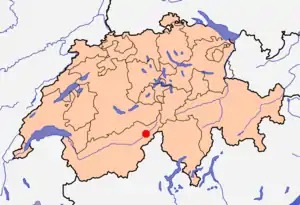| Fiesch derailment | |
|---|---|
 Location of the derailment in Switzerland | |
| Details | |
| Date | 23 July 2010 |
| Location | Fiesch |
| Country | Switzerland |
| Operator | Matterhorn Gotthard Bahn |
| Incident type | derailment |
| Statistics | |
| Trains | 1 |
| Deaths | 1 |
| Injured | 40 |
The Fiesch derailment occurred on Friday 23 July 2010, at 11:50 CET[1] when a Glacier Express train, from Zermatt heading towards St. Moritz, derailed at low speed between the cities of Lax and Fiesch, Canton Valais, Switzerland.
Two rear panorama cars were overturned while a third car derailed but remained on the track.[2]
A 64-year-old Japanese woman was killed and 42 people were injured and taken to hospital. The day after the accident 17 persons (16 Japanese, 1 Spanish) were still in hospital care.[2]
The cause of the accident was blamed on human error in that the driver was going too fast.[3] Traffic resumed on Sunday 25 July after repair and the railway had been declared safe by the Matterhorn Gotthard Bahn (operator of the Glacier Express).[4]
On 7 March 2011, it was announced that the engineer of the train at the time of its crash had been convicted of homicide and negligence, and would face a fine of 15,000 Swiss francs.[5]
The Investigation Bureau for Railway, Funicular and Boat Accidents investigated the accident.
References
- ↑ "Woman dies in Swiss train accident". Japan Times. 25 July 2010. Retrieved 18 August 2010.
- 1 2 "Railway lines in the Valais passable again". NZZ Online. 25 July 2010. Retrieved 18 August 2010.
- ↑ "Driver error to blame for Glacier Express crash". Euronews. 30 July 2010. Retrieved 18 August 2010.
- ↑ "Glacier Express: Line tested – operations running to schedule" (PDF). Matterhorn Gotthard Bahn. 26 July 2010. Retrieved 18 August 2010.
- ↑ "Engineer convicted in fatal Swiss crash". Trains Magazine. 7 March 2011. Retrieved 11 March 2011.
External links
- (in German) - Final report (Archive) Investigation Bureau for Railway, Funicular and Boat Accidents (Original report)
- (in Japanese) Japanese translation of the report (Archive) - The IBFRA noted that this is an unofficial provisional translation intended to help Japanese speakers understand the document, and is not legally binding; the original German version is legally binding